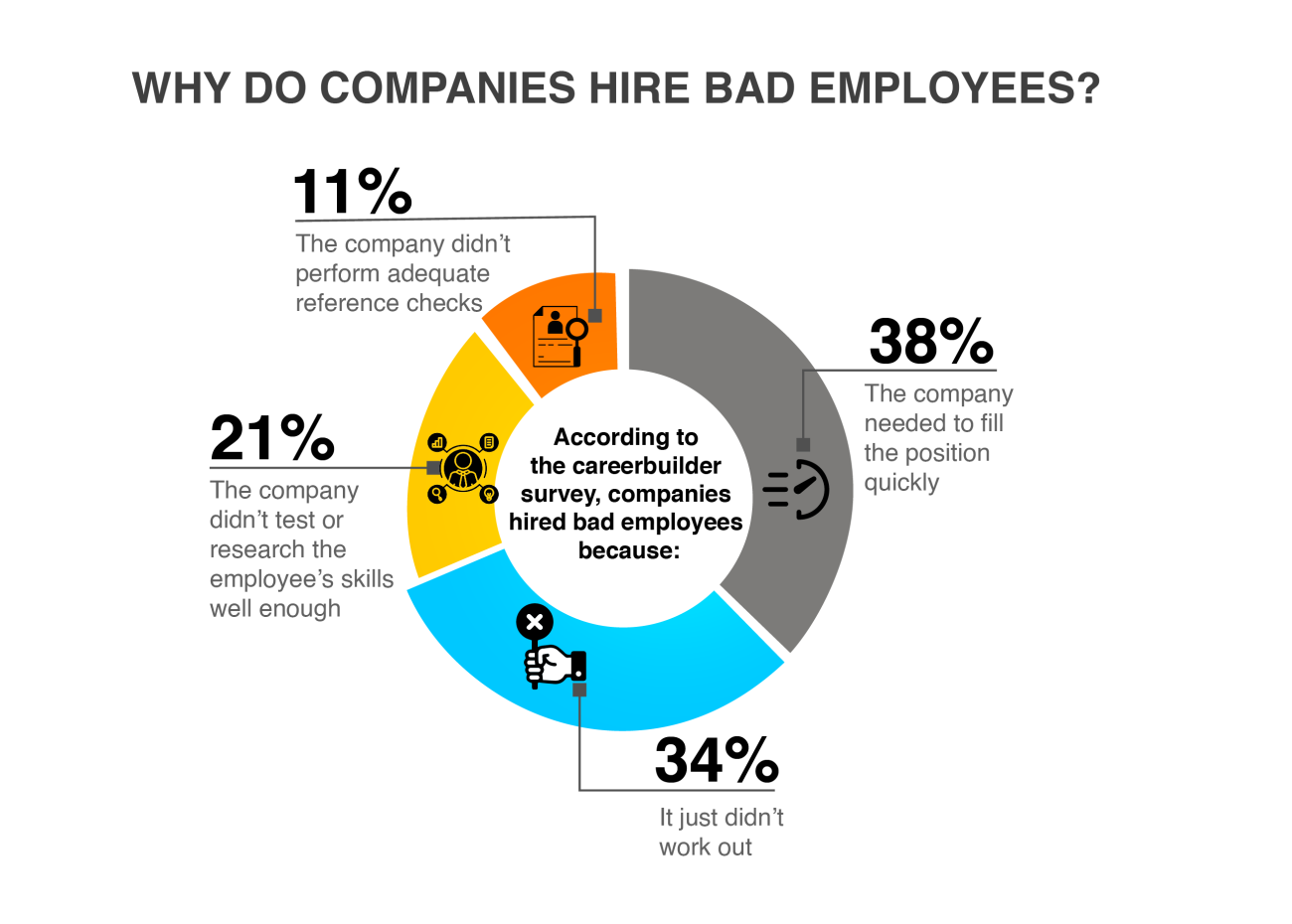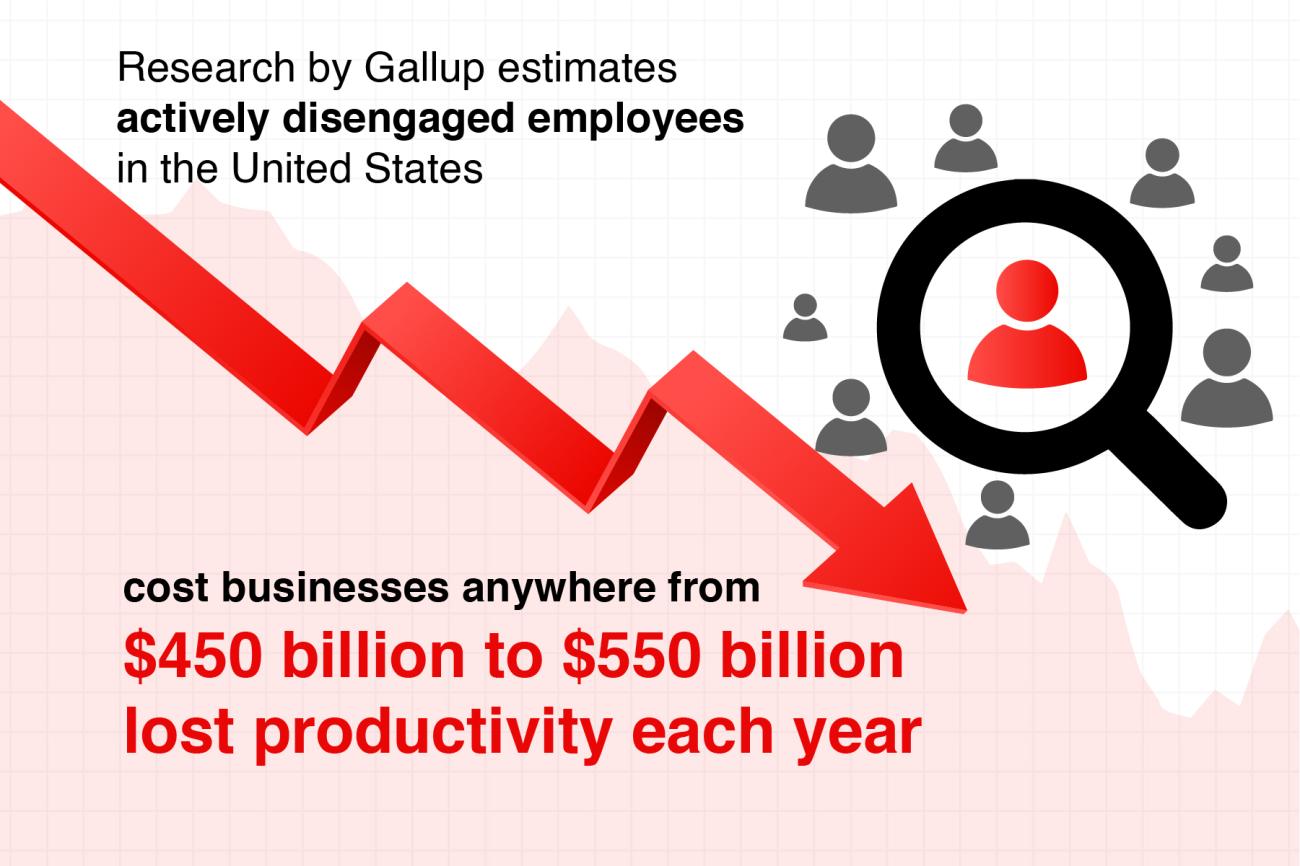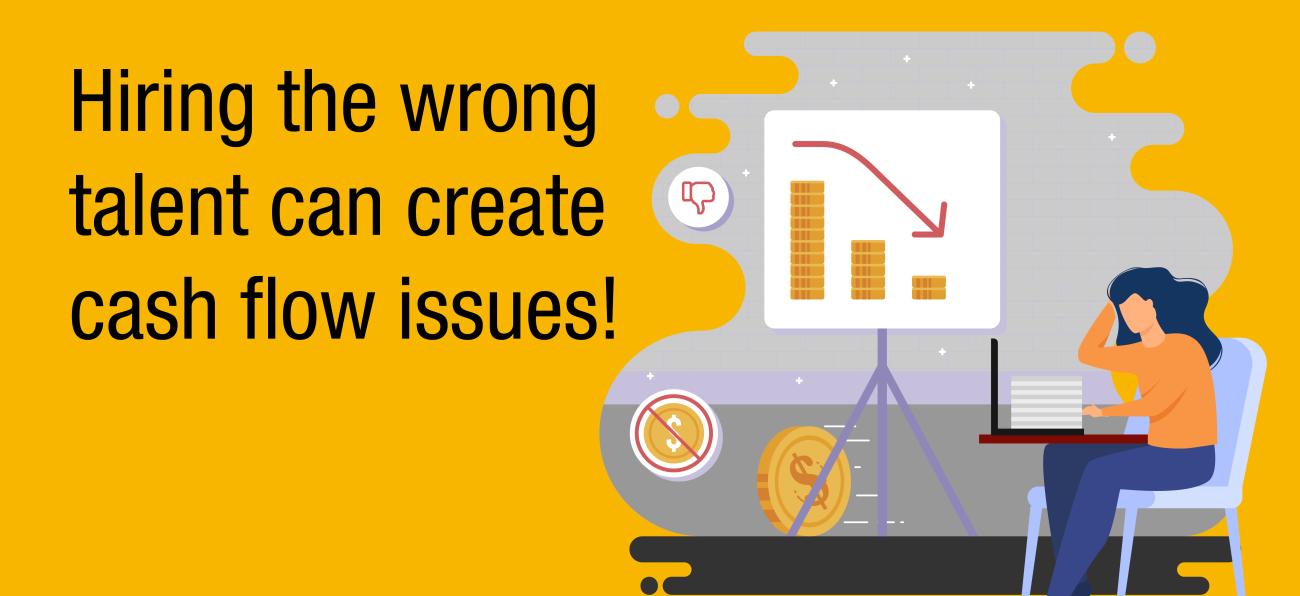Hiring the wrong talent can create cash flow issues!
Introduction
As a business owner or an entrepreneur, you don’t want to hire the wrong person. Hiring wrong can cost more than just money - it drains energy, time and costs to the company; especially as you might need to find a replacement sooner than later.
Apart from the visible, tangible direct impact on functional performance, additionally, a bad hire can cause wastage of time, effort, energy, resources, and the opportunity loss of a possible good hire.
To add fuel to that fire, a bad hire may also lead to loss of brand image, both internally and externally.
So, why does this happen?

While all organizations bear the brunt of hiring wrong, the price is especially steep for start-ups and small businesses.
While dealing with a bad hire, one of the two things can happen:
- Either we realise it quickly - fire the candidate and start the talent hunt all over again
- Spend more on the candidate in terms of training, upskilling, etc in the hopes of fitting him/her into your system and helping them reach the optimum level of performance
In both cases, you end up spending a lot of time, money and effort. And at the end of it, you cannot be sure that the candidate will become adequate and deliver the desired results for your business.
Either way, bad hires are a drain on resources. Here's how.
As an organization, what do you lose?
- Productivity costs: Typically, a bad hire would cause friction and resistance in many different forms, like - lack of alignment to team goals or ways of working, not fitting in with the culture, underperformance, rejecting opportunities for upskilling, etc. They have the potential to drain the team and make it difficult to meet deadlines and deliver. All these factors can cause a significant loss in productivity costs.
Research by Gallup estimates that actively disengaged employees in the United States cost businesses anywhere from $450 billion to $550 billion in lost productivity each year.

Thirty-nine percent of chief financial officers surveyed by Robert Half International said that bad hires had cost them productivity, and 11 percent said a bad hire resulted in fewer sales. They also said that supervisors spend 17 percent of their time -- which is about one day per week -- managing poorly performing employees.
- Financial costs & cash flow problems: Apart from the monthly salary paid to a bad hire, the organization has to bear the additional financial burden of spending time and money to train them to deliver at expected levels. On the flip side, replacing them turns out to be more expensive to the company - as they would need to pay severance pay, replacement cost, and time spent in the recruitment process. This puts you in a catch-22 situation of bar hires!
The U.S. Department of Labor estimates that the cost of a bad hire can equal 30 percent of the employee’s potential first-year earnings.
Recruiter Jörgen Sundberg, CEO of Link Humans, puts the average cost as high as $240,000 in expenses. The costs broken down relate to hiring, retention, and pay.
According to CareerBuilder, almost three-quarters of companies who made a bad hire reported an average of $14,900 in wasted money.
- Dent in team culture or employee morale: Your company is only as strong as its people. And a bad hire can prove to be the rotten apple in your barrel - one with the potential to disrupt your company culture and bring down your team morale. And they can have more impact, if they are in a leadership position.
They can cause the high performers to feel disengaged as a lot of motivation is dependent on team culture and work environment. In many cases, the bad hires may not get along with other team members causing more friction and additional problems for the cohesive working of your team.
Ninety-five percent of financial executives surveyed by Robert Half International said that making a bad hire at least somewhat affects the morale of the team, and 35 percent said a poor hire greatly influences employee morale.
- Loss of organizational reputation: Every organization protects its reputation with a fierce passion. And as a start-up or a small business, it becomes even more significant - because, you might be just getting people to recognise your presence in the market. And rebuilding lost reputation can be an uphill climb.
If your bad hire is in a client-facing position, he/she could impact the way your clients perceive you and your business.
And even otherwise, they could create a mental picture in the minds of your potential new recruits. Most job-seekers today, read up about an organization, employee-ratings, feedback, etc. before joining. Even if what they post is not true, correcting these kinds of perceptions can be extremely challenging.
In this day of internet, instant connections and quick updates, you do not want any bad reviews, information or grievances about your organization populating the world wide web.
- Time lost in training & supervising: Once you have hired a candidate, you may not fire them immediately. Most managers and organizations would initially spend time to train them and get them to a more productive position where they start delivering results. However, this can result in lost time and employee turnover and this time could have been used more effectively. Time is money!
This is true for time lost in supervising bad hires too - as you end up spending executive hours of leaders and managers who could have otherwise spent it on more core business activities.
Here are some red flags to look out for(while hiring):
- Lack of discipline: Makes excuses early on in the hiring process, is tardy or takes unusually long delays in communication when setting up interviews
- Lack of skills: Does not have the required skills and does not show willingness to learn or grow
- Focused on salary packages: Just focused on questions regarding benefits and compensation
- Lack of knowledge: The candidate has not researched your company and knows little about you or the job they are applying for
Conclusion:
No one knowingly wants a bad hire. And someone who is a 'bad hire' for you could be a wonderful employee elsewhere. It is also about a good fit for your needs and vice versa.
But it is not everyone’s strength, especially as it takes time, energy, and some expertise - defining your need, publishing it, pouring over hundreds of resumes, shortlisting candidates, setting up interviews, and more. And in the case of start-ups and small businesses, usually the founders end up doing most of the work themselves, owing to cash flow problems and tight budgets.
One simple solution is to hire a recruitment expert to do this job for you. With FlexiBees, we will be able to understand your business needs and match candidates perfectly via our deep vetting process. We present a handful of curated profiles so that you have to spend only a fraction of the time to interview and hire the right people.
Apart from the functional skills, we will also ensure they are the right fit for your organisation in terms of culture and other softer aspects.
Click on this link to let us know what you need.
We might have just the person you are looking for!


